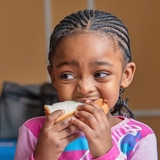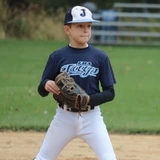New Oral Immunotherapy Treatment for Peanut Allergy: Noah's Story
New Oral Immunotherapy Treatment for Peanut Allergy: Noah's Story
Noah was 6 years old when he ate a piece of candy containing peanuts. His allergic reaction was swift and intense: repeated coughing, trouble breathing, puffy eyes and a swollen face. His mom gave him two doses of Benadryl and Noah recovered. But the terrifying experience left its mark on the family.

Then they discovered a cutting-edge new therapy at Children's Hospital of Philadelphia (CHOP) with the potential to erase their fears.
Noah participated in the clinical trial for PalforziaTM, a new oral immunotherapy (OIT) recently approved by the U.S. Food and Drug Administration to treat children and adolescents with peanut allergies. The medication, which involves a daily controlled amount of peanut protein, was designed to desensitize children and reduce the severity of allergic reactions, including anaphylaxis, due to accidental exposure to peanuts. The medication is a first-of-its-kind treatment.
“This therapy is the first FDA-approved therapy for desensitizing children and teens with peanut allergies,” says Jonathan Spergel, MD, PhD, Section Chief of CHOP's Food Allergy Center. “While it’s not a cure, it will allow patients to live their lives with less of a fear of having a serious or fatal reaction to accidently ingesting peanut protein.”
Discovering his food allergies
When Noah was young, his parents weren’t even sure he had allergies. As a baby starting solid foods, Noah had an unusually negative reaction to peanut butter. “It was nothing too dramatic, but enough that we didn’t introduce it again,” says Noah’s dad, Craig.
The family didn’t keep peanuts in the house, but they didn’t completely avoid them either. The limited contact seemed to work — Noah didn’t have any noticeable allergic reactions for the next few years.
When Noah was about 3 years old, he had a serious allergic reaction after playing with a friend’s dog. That incident prompted his parents to get more information about his allergies. Tests at his local doctor's office revealed Noah was allergic to peanuts, eggs, almonds and dog dander (tiny flecks of the animal's skin that are shed).
His parents began strict avoidance of those allergens from then on. But then came the fateful day in second grade when Noah accidently ate a piece of candy that contained peanuts. After his severe allergic reaction, his parents turned to CHOP for answers and possible treatments.
“We chose CHOP based on its reputation as a great organization with a great mission and amazing people,” Craig says.
“If there was something wrong with my child that’s where I wanted to go.”
At CHOP, Noah’s parents learned more about his allergies and received an injectable epinephrine (EpiPen®) to keep at home and school in case of accidental exposure to a food or substance he was allergic to. At the time, there weren't many treatment options for food allergies other than to avoid exposure and continue to monitor Noah for any signs he might outgrow his allergies.
Drug trial offers new hope

When Noah was 7, his parents received a call from Dr. Spergel at CHOP's Food Allergy Center. Dr. Spergel was recruiting participants for a new clinical trial at CHOP using an oral immunotherapy to treat peanut allergies in children.
OIT helps desensitize children to the foods they are allergic to by giving them small quantities of the allergen every day at home, and then gradually increasing the amount under medical supervision at the hospital. The goal of treatment is to reduce the child's sensitivity to the specific food through daily ingestion of the allergen.
The study would include two groups — one would receive a standardized dose of peanut protein, mixed into food and taken every day. The other group would receive an inactive powder, mixed into food and taken every day. Participants and families would not know if they were receiving the active drug or the placebo.
Based on Noah's prior screening results, Dr. Spergel believed he would be a good candidate for the study — if he and his parents were willing to participate. “I cried when they called," Craig says. "Noah having an opportunity for treatment was a no-brainer for us.”
However, Noah's parents got his input before making a final decision. “Noah was very clear that he wanted to give it a try," his dad says. "He felt different and excluded and it worried him. His reactions had scared him.”
Once Noah was accepted into the medication trial, he had to complete a food challenge test at CHOP to determine the exact level of peanut exposure he could tolerate before having an adverse reaction.

More about food challenges
Have a food allergy? A food challenge test may be an option for your family. Explore our interactive guide.
While Noah was nervous about the food challenge, he was committed to sticking it out. "I really didn't want to be so frantic about my food allergies and have to worry every time I went somewhere,” Noah says.
Part of the reason Noah says he was willing to participate in the trial was because of the comfort level he felt with CHOP’s doctors and nurses. "I think I had some of the best nurses in the world,” he says. “They treated me like an adult. They answered my questions and I could understand them perfectly. I couldn't imagine trying to go through what I did without their support.”
For the next year, Noah diligently took his daily "dose" and made routine visits to CHOP for monitoring.
Trial outcome — and a new challenge
At the end of the trial, Noah received bittersweet news: Though the overall clinical trial was a success, he had received no direct benefit from the medication because he was taking the placebo during the study.
With the study completed, CHOP was able to prescribe Noah with the active medication, Palforzia, but he'd have to go through the entire process for another year. Though understandably disappointed, Noah agreed to keep going.
Taking the active medication instead of the placebo was more challenging because Noah's body reacted to even the small amounts of peanut protein in the drug. But, the reactions were mild. After a few months, however, his body began to tolerate the peanut protein.
Noah's persistence paid off. After a year on the OIT, Noah experienced the breakthrough his family had hoped for. Noah completed another food challenge and was able to tolerate eating the equivalent of 18 peanuts!
"Oral immunotherapy won't work for everyone, but when it does, it's amazing," says Terri F. Brown-Whitehorn, MD, attending physician in the Food Allergy Center.
“It can transform a child's life.”
Life with less worry

Noah has since outgrown his egg and dog dander allergies, while his almond allergy is now mild and limited to only skin reactions. It’s still to be determined if the oral immunotherapy treatment for his peanut allergy had an effect on his other allergies.
“We have no regrets about participating in the study," Craig says. "It was one of our best decisions ever for Noah's long-term health.”
Now 11 years old, Noah is an active athlete with a positive outlook. He loves playing baseball and video games, as well as being a big brother. He doesn't eat peanuts as part of his regular diet, but continues the maintenance dose of peanut protein to retain his peanut desensitization. He carries an EpiPen, just in case.
“Before I took the drug, I had to be so careful and look at ingredients all the time,” Noah says. "Now I can try new foods with less worry.”
No longer does Noah fear his peanut allergy when hanging out at friends’ houses. He doesn't have to sit at an "allergy free" table for school lunches. Small changes have made a big impact on Noah’s state of mind.
“During the trial, every six months we answered survey questions: Noah wrote about how he felt, and we wrote about how we thought he felt,” says Craig. “Reading his reactions later was heartbreaking. He hid from us that it made him feel isolated, scared and afraid of dying.
“Now, he has more confidence,” Craig continues. “He’s less worried about adverse reactions, and he’s learned to be more resilient through this process.”
Craig and Noah agree that despite the ups and downs, participating in the drug trial was well worth it. They credit the expertise and care of CHOP’s clinicians for making the process easier.
“We simply could not have done this without CHOP,” says Craig. “I cannot overstate the level of respect I have for everyone we worked with — doctors, nurses, everyone — and the care and professionalism they provided. There’s nothing I wouldn’t trust them with.”
Noah concurs: "The people at CHOP are the best nurses and doctors in the world. I could not have gotten better without them,” he says.
“I just want to thank them for supporting me all the way.”